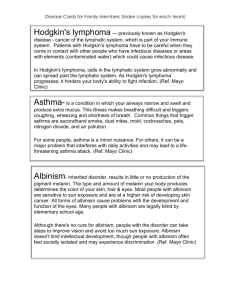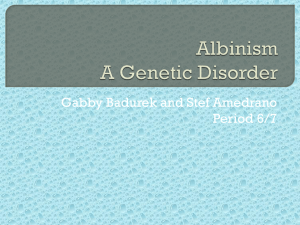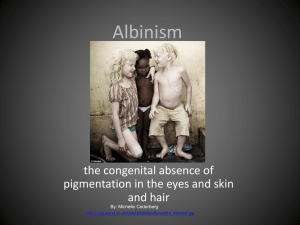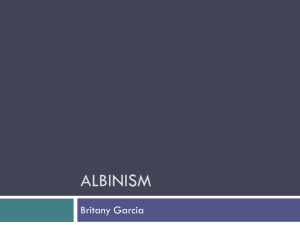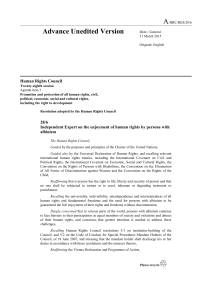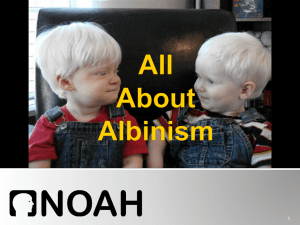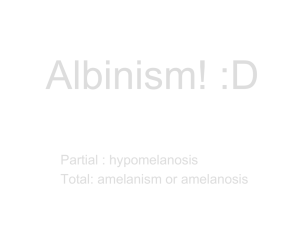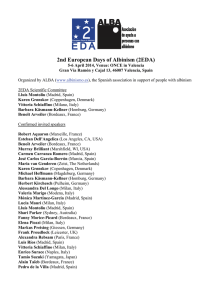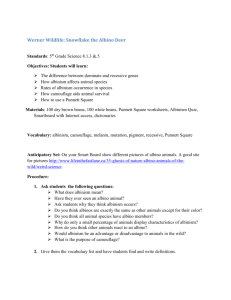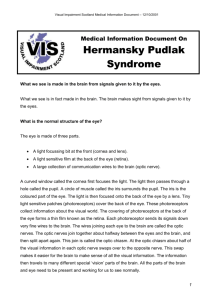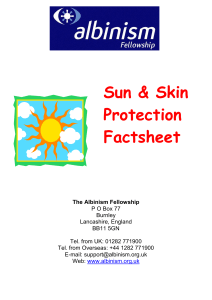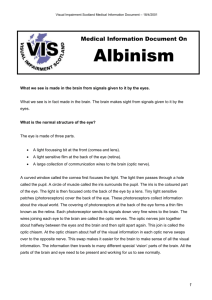Final Report
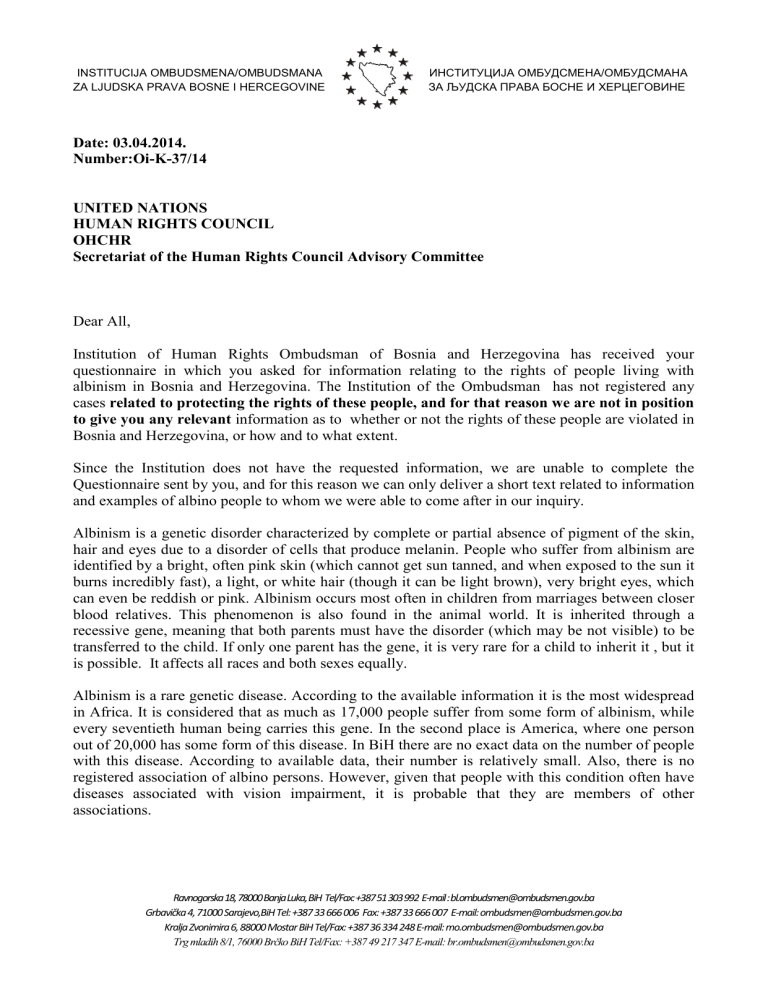
INSTITUCIJA OMBUDSMENA/OMBUDSMANA
ИНСТИТУЦИЈА ОМБУДСМЕНА/ОМБУДСМАНА
ZA LJUDSKA PRAVA BOSNE I HERCEGOVINE
ЗА ЉУДСКА ПРАВА БОСНЕ И ХЕРЦЕГОВИНЕ
Date: 03.04.2014.
Number:Oi-K-37/14
UNITED NATIONS
HUMAN RIGHTS COUNCIL
OHCHR
Secretariat of the Human Rights Council Advisory Committee
Dear All,
Institution of Human Rights Ombudsman of Bosnia and Herzegovina has received your questionnaire in which you asked for information relating to the rights of people living with albinism in Bosnia and Herzegovina. The Institution of the Ombudsman has not registered any cases related to protecting the rights of these people, and for that reason we are not in position to give you any relevant information as to whether or not the rights of these people are violated in
Bosnia and Herzegovina, or how and to what extent.
Since the Institution does not have the requested information, we are unable to complete the
Questionnaire sent by you, and for this reason we can only deliver a short text related to information and examples of albino people to whom we were able to come after in our inquiry.
Albinism is a genetic disorder characterized by complete or partial absence of pigment of the skin, hair and eyes due to a disorder of cells that produce melanin. People who suffer from albinism are identified by a bright, often pink skin (which cannot get sun tanned, and when exposed to the sun it burns incredibly fast), a light, or white hair (though it can be light brown), very bright eyes, which can even be reddish or pink. Albinism occurs most often in children from marriages between closer blood relatives. This phenomenon is also found in the animal world. It is inherited through a recessive gene, meaning that both parents must have the disorder (which may be not visible) to be transferred to the child. If only one parent has the gene, it is very rare for a child to inherit it , but it is possible. It affects all races and both sexes equally.
Albinism is a rare genetic disease. According to the available information it is the most widespread in Africa. It is considered that as much as 17,000 people suffer from some form of albinism, while every seventieth human being carries this gene. In the second place is America, where one person out of 20,000 has some form of this disease. In BiH there are no exact data on the number of people with this disease. According to available data, their number is relatively small. Also, there is no registered association of albino persons. However, given that people with this condition often have diseases associated with vision impairment, it is probable that they are members of other associations.
Ravnogorska 18, 78000 Banja Luka, BiH Tel/Fax: +387 51 303 992 E-mail : bl.ombudsmen@ombudsmen.gov.ba
Grbavička 4, 71000 Sarajevo,BiH Tel: +387 33 666 006 Fax: +387 33 666 007 E-mail: ombudsmen@ombudsmen.gov.ba
Kralja Zvonimira 6, 88000 Mostar BiH Tel/Fax: +387 36 334 248 E-mail: mo.ombudsmen@ombudsmen.gov.ba
Trg mladih 8/1, 76000 Brčko BiH Tel/Fax: +387 49 217 347 E-mail: br.ombudsmen@ombudsmen.gov.ba
Experience of a family in BiH
The family of 29 -year-old MK there are two children with albinism, he and his older sister. His sister is the second, and he is the fourth child of their parents. The first and the third sister have quite regular skin color. Owing to that, they did not experience any of the problems in their life to which MK and his sister were exposed.
- When I was a kid and before I knew how to take care about myself, I often had severe sunburns. Neither the mother knew initially that I was so sensitive, so I went outdoors in the summer without a shirt. It took just five minutes in the sun and my skin got burns and blisters appeared. The worst was on my back and scalp. After that my mother anointed them with lily oil, yogurt ... And that was easier to endure than the period when the blisters started to shoot, skin peeling, with pain and itching deep beneath the skin. Luckily, I'm not in the most severe category of albinism, what then would be - asks MC.
Because albinism since birth he has vision problems. Mom says that from the first grade she had to intervene in school, to get me a place in the front row so that I could see what the teacher write on the blackboard.
-Already in the seventh grade, I almost did not see anything. Children provoked me, they called me "Purblind" and "Blond". However, it was not that hard for me as teachers’ comments that I needed glasses like gallons. They had no sympathy for me, so I decided to switch to Sarajevo, first to primary, and then to secondary school, department of physiotherapy, at the Center for blind and partially sighted persons. Low vision was estimated first time in 80, the second time at 70 percent. I have hard times in winter, when the snow is everywhere, and then came strong sunshine. I cannot live without photosensitive glasses. As to sunlight, I learned to protect against it, too. I even go to the seaside. I swim in a T-shirt and shorts; as soon as I get out of the water I wear dry clothes and sit in the shade. I wear a hat and do not linger long outside when very warm.
Otherwise, I cannot live in some other way, but I got used to it.
If taken into account the experience of this family, then it could be certainly said that people with albinism do not enjoy the full protection, they are often discriminated against in all spheres of life, and the lack of association contributes to even more difficult realization of the right to equal treatment. This unenviable position of these people can be somewhat justified by their small number. On the other hand, the lack of an adequate data base on the number of people with albinism and not taking measures and actions by the competent authorities indicates indifference of such authorities concerning exclusion of people with albinism from ordinary and everyday life, including all spheres of social life.
We sincerely hope that this information will help at least to partially contemplate the situation in this area and that the letter that you are referred to will contribute to the creation of measures and activities and mechanisms necessary for creation of conditions for equal treatment and equal exercise of the rights of people living with albinism.
2
Sincerely,
INSTITUTION OF HUMAN RIGHTS OMBUDSMAN OF BOSNIA AND HERZEGOVINA
3
